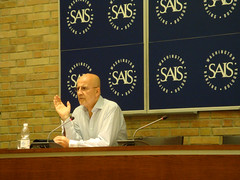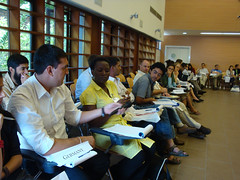 The week of post conflict and reconciliation started with the lecture of ambassador Alvaro De Soto. With extensive experience at the United Nations, particularly taking part in the negotiations that led to peace agreements in El Salvador and Cyprus, Mr. de Soto was able to explain the change of the intervention processes models carried out by the UN. Especially after the cold war, when most part of the conflicts started to take place within the state (intra- state) and not between states (inter-state), as it used to be. According to him, it was clear that the mentality of the international community regarding peace operations and the role of the United Nations needed to change and more complex interventions needed to be discussed.
The week of post conflict and reconciliation started with the lecture of ambassador Alvaro De Soto. With extensive experience at the United Nations, particularly taking part in the negotiations that led to peace agreements in El Salvador and Cyprus, Mr. de Soto was able to explain the change of the intervention processes models carried out by the UN. Especially after the cold war, when most part of the conflicts started to take place within the state (intra- state) and not between states (inter-state), as it used to be. According to him, it was clear that the mentality of the international community regarding peace operations and the role of the United Nations needed to change and more complex interventions needed to be discussed.
Ambassador de Soto referred to Peacemaking operations as the deployment of armed personnel in a war zone to create the geographical and political space for the involved parties in the conflict to discuss and address the underlined issues that caused the conflict and achieve a successful agreement through mediation by the international community. He also discussed the role of former United Nations Secretary General Boutros Galhi  and his Agenda for Peace that paved the way for the UN upcoming peace operations. Besides that, he also discussed the formation of the Department of PeaceKeeping Operations (DPKO) and the Department of Political Affairs that would assist and create the conditions for the necessary interventions. Finally, he explained the context of the conflicts in Cyprus and El Salvador and the successes and failures of the Peace Agreements and how the local civil societies are dealing with the reconciliation process.
and his Agenda for Peace that paved the way for the UN upcoming peace operations. Besides that, he also discussed the formation of the Department of PeaceKeeping Operations (DPKO) and the Department of Political Affairs that would assist and create the conditions for the necessary interventions. Finally, he explained the context of the conflicts in Cyprus and El Salvador and the successes and failures of the Peace Agreements and how the local civil societies are dealing with the reconciliation process.
Thiago Wolfer, Brazil

